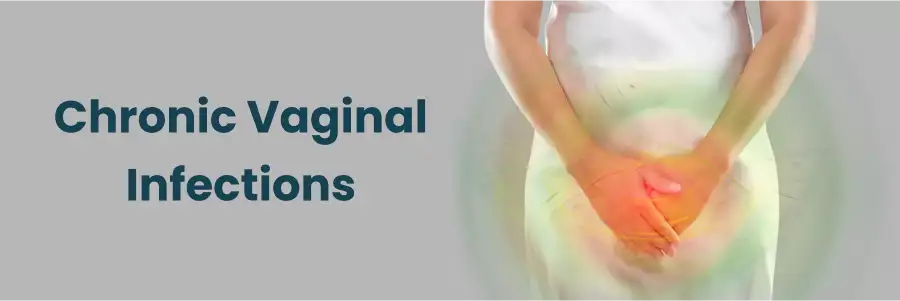- Cardiology 84
- Dermatology 45
- Endocrinology 33
- ENT 16
- Fertility 190
- Gastroenterology 78
- General-Medicine 81
- Gynecology 80
- Hematology 19
- Infectious-Diseases 33
- Neurology 52
- Oncology 34
- Ophthalmology 23
- Orthopedics 69
- Pediatrics 31
- Procedure 23
- Public-Health 144
- Pulmonology 59
- Radiology 8
- Urology 68
- Wellness 161
- Woman-and-child 77

What Causes Chronic Vaginal Infections? Preventive Tips
Chronic vaginal infections can be frustrating and uncomfortable for many women. These persistent infections can affect daily life and overall well-being. Understanding the causes and how to prevent and treat them is crucial for maintaining vaginal health.
In this article, we will explore what causes chronic vaginal infections, how to prevent them, and effective treatment methods.
Secure your health with a second opinion. Make informed decisions and book your appointment today!
Get A Second OpinionUnderstanding Chronic Vaginal Infections
Chronic vaginal infections are infections that recur frequently, even after treatment. These infections can be caused by various factors, including bacteria, yeast, and other microorganisms. Understanding the root causes can help in managing and preventing them effectively.
Common Causes of Chronic Vaginal Infections
- Bacterial Vaginosis (BV):Caused by an imbalance of natural bacteria in the vagina.Symptoms include a thin, grayish-white discharge with a fishy odor.
- Yeast Infections:Caused by an overgrowth of Candida, a type of fungus.Symptoms include itching, burning, and a thick, white discharge.
- Sexually Transmitted Infections (STIs):Infections such as Trichomoniasis can cause chronic vaginal infections.Symptoms vary but may include unusual discharge and discomfort.
- Hormonal Changes:Hormonal fluctuations during menstruation, pregnancy, or menopause can affect vaginal health.These changes can make the vagina more susceptible to infections.
- Immune System Weakness:A weakened immune system can lead to recurrent infections.Factors like stress, poor diet, and chronic illnesses can impact the immune system.
Prevention of Vaginal Infections
Preventing chronic vaginal infections involves maintaining good hygiene and making lifestyle changes. Here are some practical tips to keep infections at bay:
Hygiene Practices
- Regular Cleaning:Wash the vaginal area with mild, unscented soap and water.Avoid using harsh soaps, douches, or scented products that can disrupt the natural balance.
- Proper Wiping Technique:Always wipe from front to back after using the toilet to prevent the spread of bacteria.
- Breathable Underwear:Wear cotton underwear to allow air circulation.Avoid tight-fitting clothes that can create a warm, moist environment for bacteria and yeast to thrive.
Lifestyle Changes
- Healthy Diet: Incorporate probiotics like yoghurt into your diet to maintain a healthy balance of bacteria. Avoid excessive sugar intake, as sugar can promote yeast growth.
- Stay Hydrated:Drink plenty of water to flush out toxins and maintain overall health.
- Safe Sex Practices: Use condoms to reduce the risk of STIs.Limit the number of sexual partners to minimise exposure to potential infections.
- Manage Stress: Practice stress-reducing techniques like meditation, yoga, or deep breathing exercises. Chronic stress can weaken the immune system, making you more susceptible to infections.
Treatment Methods for Chronic Vaginal Infections
If you are experiencing chronic vaginal infections, it is essential to seek medical advice. Here are some standard treatment methods:
Medical Treatments
- Antibiotics: These are prescribed for bacterial infections like BV.It is crucial to complete the full course of antibiotics as prescribed.
- Antifungal Medications: Used to treat yeast infections.Available in various forms, including creams, ointments, and oral tablets.
- Antiviral Medications:Prescribed for viral infections like herpes.Helps manage symptoms and reduce the frequency of outbreaks.
Home Remedies
- Probiotics: Consuming probiotics can help restore the natural balance of bacteria in the vagina.Available in yoghurt, supplements, and fermented foods.
- Tea Tree Oil: Has natural antifungal and antibacterial properties. Dilute with a carrier oil and apply externally, but consult a doctor before use.
- Garlic: Known for its antimicrobial properties.It can be consumed raw or in supplement form, but consult a healthcare provider before trying this remedy.
When to See a Doctor
- If you experience recurrent infections despite following prevention tips.
- If you have severe symptoms such as intense itching, burning, or unusual discharge.
- If over-the-counter treatments do not provide relief.
Conclusion
Chronic vaginal infections can be challenging, but understanding the causes and taking preventive measures can significantly reduce their occurrence. Maintaining good hygiene, making lifestyle changes, and seeking appropriate medical treatment are key to managing and preventing these infections.
By following these guidelines, you can improve your vaginal health and reduce the frequency of chronic infections. Remember, if you have any concerns or persistent symptoms, it is always best to consult a healthcare professional for personalized advice and treatment.
Ready to take control of your health journey? Book your appointment now and start your path towards wellness today!
Book an AppointmentFrequently Asked Questions
Causes include hormonal imbalances, diabetes, antibiotic use, and poor hygiene.
Prevention involves maintaining good hygiene, avoiding irritants, and managing health conditions.
Treatment typically involves antibiotics or antifungal medications, depending on the cause.
Persistent infections may be due to unresolved underlying conditions or incomplete treatment.
Management includes addressing underlying causes and following a full course of prescribed treatment.

- Cardiology 2132
- Dermatology 168
- Endocrinology 135
- ENT 97
- Fertility 217
- Gastroenterology 232
- General 478
- General-Medicine 1685
- Gynecology 169
- Hematology 85
- Infectious-Diseases 208
- Neurology 207
- Oncology 345
- Ophthalmology 65
- Orthopedics 187
- Pediatrics 83
- Procedure 72
- Public-Health 209
- Pulmonology 126
- Radiology 13
- Second Opinion 311
- Urology 294
- Wellness 600
- Woman-and-child 447
- Others 10217
Related Blogs
If you have any questions, please fill out the enquiry form or call us, and we will get back to you promptly.
040-68334455